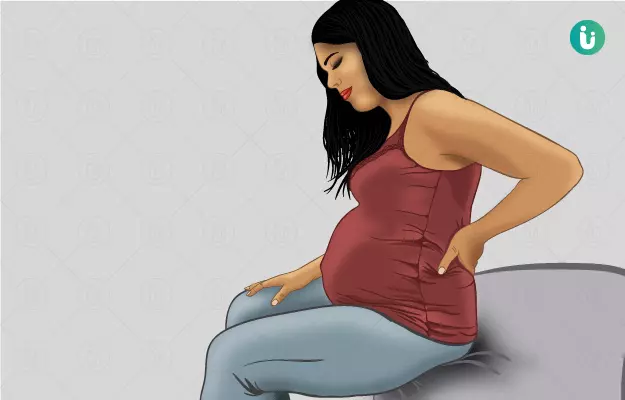Back pain in pregnancy may be due to several physical and hormonal changes occurring during this period. During different trimesters and at different stages of pregnancy, the reasons for back pain can be vary. Following are the most important physiological and pathological causes of back pain during pregnancy:
Changes in hormonal activity during early pregnancy
It is quite inevitable to go through a bundle of hormonal changes during pregnancy. More often, back pain experienced during early pregnancy is merely a manifestation of these hormonal changes since changes in the body size are not so pronounced at this stage. During this time, pain along with an inflammation of the lower back is experienced by women.
Apart from the hormonal changes, there are some additional causes that may be associated with back pain in the later stages of pregnancy. Let us have a look at them:
Weight gain
As you gain weight during pregnancy, there is an increase in the abdominal size, which tends to shift the centre of gravity of the body. This increases the magnitude of forces to the lumbar spine, which is present in the area of the lower back and causes you to experience pain in the area.
Change in posture
Due to an increase in the abdominal size and stretching of the abdominal muscles, there is a change in the body posture during pregnancy to support the growing abdomen and to manage movements. Gradually, this causes a change in the curvature of the spine causing it to curve inwards. As this happens, the magnitude of stress and forces experienced in this area further increases making you to feel more pain.
Excessive physical activity
While it is important to be physically active during pregnancy, it is essential that you minimise extreme activities if you experience lower back pain. Studies have found that women who suffer from lower back pain during pregnancy take a longer time to recover after physical activity than women without back pain. So, if you already experience back pain, continuing with excessive activity is likely to worsen your concern.
Multiple foetuses
Weight gain due to multiple foetuses is more and so is the abdominal girth. As more and more relaxin, a hormone released during pregnancy, is increased to facilitate abdominal growth, joint laxity is diminished and back pain is manifested.
Venous congestion
Extreme lower back pain during pregnancy cannot be entirely physiological as opposed to the above-listed factors. If back pain is so severe that it causes you to wake up from your sleep and is more so during the night, it can be a consequence of venous congestion in the pelvis and the lumbar spine. This occurs due to the growing size of the abdomen, exerting a pressure on the vena cava, which gets worse when you lie down.
Congestive heart failure
Sometimes, a very extreme back pain during pregnancy can be reflective of congestive heart failure, due to the aforementioned mechanism. So, it is important to differentiate between normal and severe back pain during pregnancy and not ignore your symptoms if pain is experienced intensely.
Sciatica
Less commonly, back pain during pregnancy can be due to bulging out of the intervertebral disc causing nerve compression in the area, which results in sciatica. In these cases, lower back pain may radiate to the back of the leg and is typically manifested on one side of the body. This is quite an uncommon cause, occurring in about 1% of the pregnant women.
Other causes
Back pain during pregnancy can also be associated with other conditions, which would cause back pain in the remaining population. These include disc problems, degenerative disc disease, infection, pregnancy-induced osteoporosis and even malignancy.
In such cases, back pain can not only cause foetal defects and preterm labour but also lead to serious issues with the health of the mother and in serious cases, death.
So, it is important that an abnormal back pain during pregnancy is managed at the earliest.

































